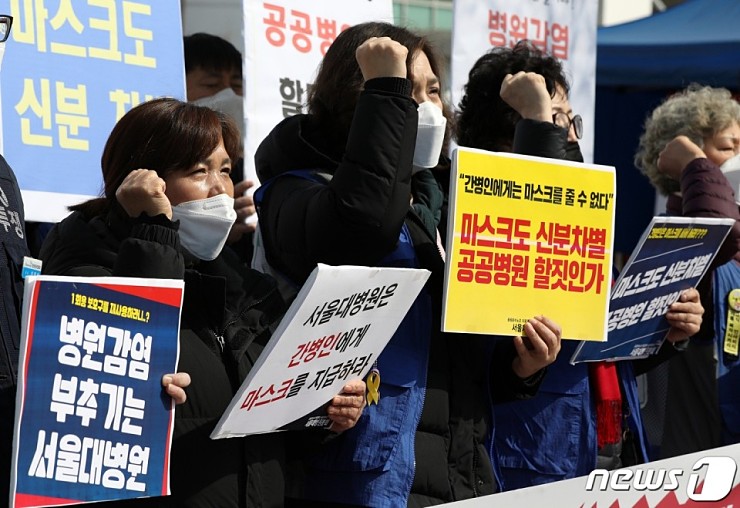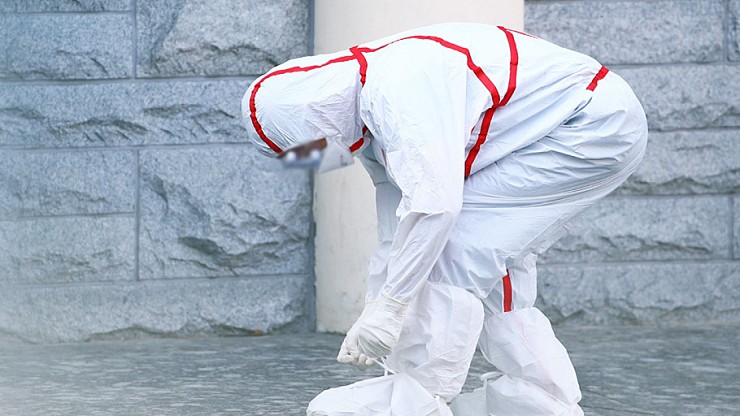As the Corona19 crisis continues, medical staff working on the front lines, continue to fight the virus every day. The biggest obstacle they face is a lack of protective equipment keeping them safe from infection. Medical workers are safely exposed to the virus while attending to patients, while wearing plastic protective suits over their hospital attire. The life-saving clothing is essential for preventing them from infection, but there is a shortage in supply at the moment. The scarcity of protective equipment, including specially designed masks, is causing concern at medical sites across the country.
 |
| ▲ Medical staff of Seoul National University Hospital are holding a press conference in front of SNUH on March 6. (Photo from News1) |
As the number of confirmed COVID 19 patients increase, the number of patients being treated at designated clinics is also increasing. However, due to a lack of protective suits, medical staff are being forced to some up with makeshift protective wear are emerging. Attending medical staff in hospital attire are covering their heads with surgical hats, their mouths with masks, and their hands with plastic gloves. This is very different from the required outfit, a plastic suit sealed from head to toe, including protective glasses and a face protecting mask. In order to address shortage issues, the government announced on the Feb 5th that it would distribute 1 million masks, 10 percent of the total daily production, to medical staff. However, the number each institution receives is based on the reported number of health care providers on record with the Health Insurance Review and Assessment Service. It does not account for service workers or administrative personnel even if they work in the same place. The Four associations of medical services, hospitals, doctors, dentists and the oriental doctors association, have opted to urgently set up an alternative plan to protect their service workers. They planned to distribute an additional 1 million public safety goods to medical institutions a day, but even this is not enough to protect workers in the medical field.
In addition to mask shortages, COVID 19 attending staff, who face patients daily are not receiving the requisite level-D protective suits. Critics say it is not right to distribute this equipment to frontline medical staff in hospitals alone. However, with everyone needing protection there will be further shortages in supply because people need to change their protective suits every time they take samples. To combat this problem, health authorities have sent an official letter to medical staff, who collect samples face-to-face, recommending they instead wear a "closed set" that includes gloves, safety glasses and respirator protective gear instead of a level-D protective suit.
The shortage of protective clothing and gear has also caused conflicts at medical sites. On March 6, frontline medical staff held a press conference in front of Seoul National University Hospital (SNUH) with placards protesting the SNUH policy that staff reuse mask. They claimed that SNUH gave instructions to medical staff, who nurse and care for confirmed cases of COVID-19 patients, to disinfect and reuse their disposable protective items such as masks. They also criticized the hospital for not providing masks for caregivers who are in contact with patients 24 hours a day. The protesting medical staff urged the hospital to provide enough masks to protect all involved medical staff and caregivers. Organizations of labor safety and health and human rights groups, including the Kim Yong-kyun Foundation, issued a joint statement on March 6. They called on the hospital to provide masks to medical staff taking care of patients to prevent the further spread of COVID-19. The Korean Confederation of Trade Unions of SNUH said that "We have used disposable PAPR hoods and goggles by sterilizing them with EO gas. However, even if you are good at disinfection, safety from reuse is not guaranteed anywhere."
Seoul National University Hospital refuted the accusations saying it never ordered disposable protective gear to be reused and that masks for caregivers are being provided if they request the items in person. In addition, medical personnel argued that Level D protective clothing be distributed firstly to the medical team most closely facing COVID-19 patients. This is because it is easy to run out of level D protective clothing because you need to wear a new one, every time they collect a specimen.
To dive deeper into the medical supplies’ shortage problem, The Dankook Herald interviewed Ma Sang-hyeok, Director of Foreign Cooperation, Information and Communication at the Korean Hospital Doctors Association. According to Ma, the local government is distributing protective clothing to the isolation hospitals including Daegu and North Gyeongsang Province. Although there are differences by regions, protective clothing is now gradually being supplied. When asked about the reason for the lack of medical supplies, he explained that it is because we were unprepared for a national emergency situation. He also stated that the unexpected quick spread of the virus in Daegu could also be the reason for the shortage of anti-contamination clothing and disinfection supplies. To solve the problem, he suggested that the Central Disaster and Safety Countermeasures Headquarters (CDSCHQ) and Disaster Response Division should measure the demand and supply of protective clothing and attempt to boost production to meet our needs. Saying that the Coronavirus will last for a long time, he stressed the importance of planning safety measures like minimizing the number of infections in communities and treating serious patients as soon as possible. In addition, managing the dualized hospitals to prevent further infection and harm is critical to controlling the further spread of the disease. When the DKH asked him whether expanding intensive care units in private hospitals will continued after the COVID-19, he mentioned that there are a lot of problems with this issue because it is getting harder to treat critical patients who are not suffering from COVID-19. He said that it is necessary to take care of COVID-19 patients mainly in public hospitals and only move to private hospitals if the demand increases.
The only way to protect medical teams from the virus is to supply them with the requisite protective gear. In the face of this shortage, the government has to respond with haste and protect their frontline personnel. With COVID-19 spreading across the country, the safety of patients and medical teams should be a priority. It is the only way to ensure their continued wellbeing, so medical teams can focus on treating patients without worry of someday becoming one themselves.
 |
| ▲ Protective suit is absolutely necessary to prevent medical staff from infection, but there is a large shortage at the moment. (Photo from Naver news) |
남윤경, 김건희, 심민정 dankookherald@gmail.com

![[Campus Magnifier] Let's Surf the Library!](/news/photo/202404/12496_1765_4143.jpg) [Campus Magnifier] Let's Surf the Library!
[Campus Magnifier] Let's Surf the Library!
![[Campus Magnifier] Let's Surf the Library!](/news/thumbnail/202404/12496_1765_4143_v150.jpg)





